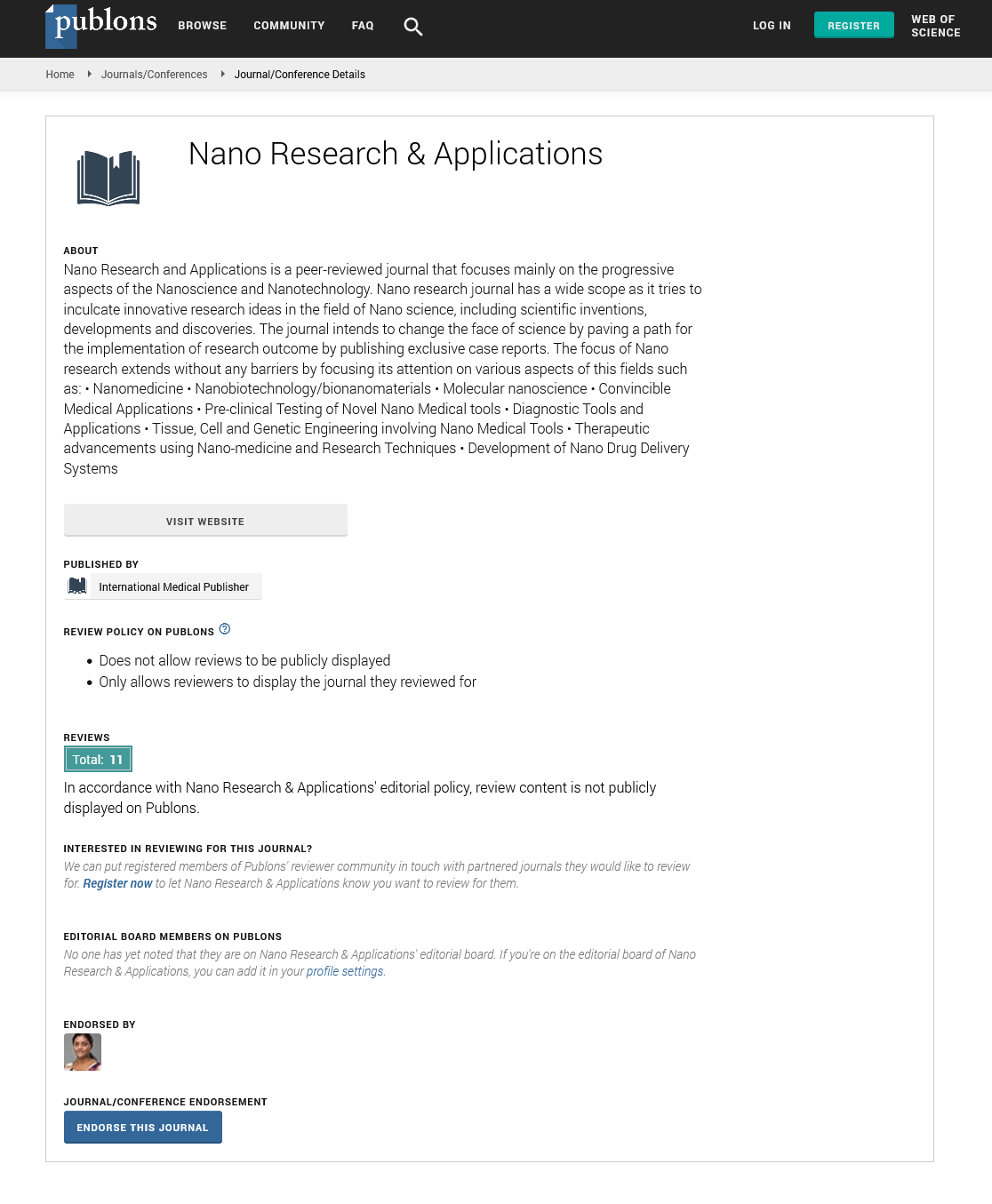ISSN : 2471-9838
Nano Research & Applications
Tailoring the properties of structural adhesives and fibre reinforced plastics using nanoadditives
EuroSciCon Conference on Nanotechnology & Smart Materials
October 04 -06 ,2018 Amsterdam , Netherlands
A Ivankovic, N Murphy, D Quan, D Carolan, C Rounge and J Labarga Urdaniz
University College Dublin, Ireland FAC Technology, UK Universidad Politecnica de Madrid, Spain
ScientificTracks Abstracts: Nano Res Appl
DOI: 10.21767/2471-9838-C6-024
Abstract
This work examines the effects of nano-additives, including core-shell rubber (CSR) nanoparticles, silica nanoparticles, multi-walled carbon nanotubes (MWCNTs), graphene nanoplatelets and their hybrid combinations on the mechanical properties, electrical conductivity and fracture toughness of epoxy based structural adhesives and carbon reinforced plastics (CFRPs). The addition of CSR nanoparticles significantly increased the fracture toughness of epoxies with the main toughening mechanisms being rubber cavitation followed by plastic void growth and shear band yielding. For example, the addition of 30 vol% CSR nanoparticles increased the fracture energy of a structural adhesive joint by over ten fold. However, the addition of CSR nanoparticles reduced the mechanical properties, i.e. stiffness of the modified resin. Hybrid nano-composites where silica/CSR nanoparticles were mixed into the resin at appropriate ratios eliminated this problem and a good balance between the toughness and mechanical properties is achieved i.e. nano-composites with a fracture energy five times that of the unmodified epoxy were obtained with no discernible drop in mechanical properties. The addition of a small amount of MWCNTs/graphene yielded reasonable increase in the fracture energy of epoxy. However, the agglomeration of MWCNTs/graphene at a higher concentration resulted in decrease in the mechanical properties and fracture toughness. Excellent electric conductivity was obtained for adding only a small amount of MWCTNs/graphene (<0.5%) in the epoxies. The incorporation of MWCNTs to bulk epoxy and CFRPs moderately increased the mode-I fracture energy, and significantly increased the mode-II fracture energy, i.e. the average mode-II fracture energy of CFRPs increased from 2026 J/m2 to 5491 J/m2 due to the addition of 1 wt% MWCNTs. The superior toughening performance of MWCNTs in mode-II fracture is attributed to two reasons: 1) increased MWCNT breaking and crack deflection mechanisms under shear load, and 2) large fracture process zone accompanied with extensive hackle markings and micro-cracks ahead of the mode-II crack tip of CFRPs, which resulted in significant number of MWCNTs contributing to toughening mechanisms.
Biography
A Ivankovic is a Professor of Mechanics of Materials (since 2004) and Head of Mechanical Engineering Programs (since 2012), (Head of Mechanical Engineering Discipline 2006-2011). He is a Founding Director of UCD Centre of Adhesion and Adhesives established in 2010, and UCD-Bekaert University Technology Centre (UTC) established in 2015. He is also a Visiting Professor at Imperial College London, ex Head of Structural Adhesives Division of Adhesion Society (2014-2016), Irish Elected Member for International Fracture Society (2017-), an External Examiner of ME Mechanical program at Trinity College Dublin (2016-). Currently, he leads the research group of 5 MSc, 7 PhD students and 4 PostDoc researchers. The main research focus of the group is the process-structure-property relationship towards materials by design, which involves multiscale characterisation and modelling of thermo-mechanical, damage and fracture behaviour and nanomodification and tailor design of polymers, composites, adhesives and super hard materials. Recently, the group’s research also focuses on additive manufacturing. The group has access to excellent processing, thermo mechanical testing, video, microscopy, analytical and high performance computing facilities. His track record includes: i) 340 publications (105 journal, 5 book chapters, 230 conference), ii) 25 graduated PhDs (4 of which are Full Professors), 25 MSc students, 15 past Postdocs and 1 Marie Curie Research Fellow, iii) 1 patent, iv) 1 licence, v) Strong links and collaboration with industry and academia both nationally and internationally, vi) Memberships of a number of scientific committees, Editorial Boards, Review Panels, coordination of an international ESIS Mixed Mode Round Robin. His area of expertise includes fracture, modelling, polymers, composites, adhesives.
E-mail: Alojz.ivankovic@ucd.ie
Google Scholar citation report
Citations : 387
Nano Research & Applications received 387 citations as per Google Scholar report
Nano Research & Applications peer review process verified at publons
Abstracted/Indexed in
- Google Scholar
- China National Knowledge Infrastructure (CNKI)
- Directory of Research Journal Indexing (DRJI)
- WorldCat
- Publons
- Secret Search Engine Labs
- Euro Pub
Open Access Journals
- Aquaculture & Veterinary Science
- Chemistry & Chemical Sciences
- Clinical Sciences
- Engineering
- General Science
- Genetics & Molecular Biology
- Health Care & Nursing
- Immunology & Microbiology
- Materials Science
- Mathematics & Physics
- Medical Sciences
- Neurology & Psychiatry
- Oncology & Cancer Science
- Pharmaceutical Sciences
